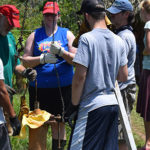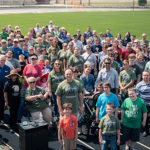Posted: 12/07/07
Mission workers help bring clean
water, love of Christ to Ethiopia
By Carla Wynn Davis
Cooperative Baptist Fellowship
RIFT VALLEY, Ethiopia (ABP)— Nearly 75 percent of Ethiopians—about 55 million people—lack access to clean water. It’s a crisis not discussed often enough, according to missionary workers there.
Many Ethiopians drink from rivers in areas known for famine, malnutrition and cholera outbreaks. That “silent tsunami” is responsible for the deaths of millions around the world each year, said David Harding, a field representative with the Cooperative Baptist Fellowship.
| In Ethiopia, children often spend a lot of their time each day fetching water instead of going to school or helping on their family’s farm. (CBF Photo) |
Needless to say, a rush of fresh, drinkable water brings a rush of joy to people in Ethiopia. Harding works to make that happen.
Harding, works with Living Water Ethiopia, a group that helps churches use simple techniques to bring clean water to the Rift Valley region. Since July 2006, they have drilled nearly 30 wells that provide hundreds of people with clean water. They also use seeds and sand filter techniques to clean water.
A working well means no more trips to the muddy river to gather water and haul it home. It means less disease, more crops and less famine. It means more time with family and greater opportunity for education.
Access to water can transform communities and unite people, Harding said. During one of his trips to Africa, the Christian and Muslim communities worked together to drill a well. When the drill bit became lodged many feet underground, both faith communities joined hands and prayed for God to intervene.
“It was probably the first time they did anything together,” Harding said. “Water has that draw. Everybody needs water, and the church was able to use the water to say: ‘We care about you. Access to safe water is a human right for all.’”
A child of missionaries, Harding was born in Ethiopia, and he lived there 10 years. Now based in Orlando, Fla., Harding travels to Ethiopia about four times a year.
He returns often because about half the wells in Africa no longer function, he said. Most are broken because they aren’t well-maintained, Harding said, so teaching people to care for the technology is essential.
“If improving access to safe water for a billion people in the world was simply a technical problem, it would have been solved long ago,” he said. “It’s a behavioral problem where people need to see the connections between water and disease and to feel empowered to do something about it.”
It costs Living Water Ethiopia about $2,500 to dig a well that services up to 400 people initially. As more wells are established in a community, wells typically serve 50 people and their livestock.
In short, training and maintenance can translate directly into less disease, more crops and less famine—true tranformation.
In addition to working in Ethiopia, Harding serves in other developing countries as the Fellowship’s coordinator for international disaster response.
Most years, the Hardings travel to a developing country to serve as a family. Harding’s wife, Merrie, a physical therapist, uses her skills through local clinics, and their three children—Dave, Leah and Merrie Grace—help dig wells or assist in orphanages. While in Orlando, the Hardings collect hats and dresses to distribute in Ethiopia and other countries.
“Working out of what Christ has done for us is a statement of care,” David said. “People want to know why, and it’s because we are first moved by God’s love for us.”














We seek to connect God’s story and God’s people around the world. To learn more about God’s story, click here.
Send comments and feedback to Eric Black, our editor. For comments to be published, please specify “letter to the editor.” Maximum length for publication is 300 words.